#admiral samuel wilkinson
Text
First Rate Prizes of the Royal Navy during the 18th century
You might think that since there were first rates there have been many who captured the Royal Navy, but that's not the case. The first one was captured in 1782. This had to do with the fact that the Dutch did not bring their first rate on the market until 1680, which did not correspond to the British first rate. The French built some very specatular first rates, but their number was very small. In 1692, the Royal Navy almost succeeded in capturing the Soleil Royal, 104- guns, as a prize when the French encountered the Anglo-Dutch fleet. But they preferred to burn her as to take her as a prize.

Modern Model of the Soleil Royal, 140- guns
The interest of the French in first rates was very low. This changed only with the reverses of the seven-year war which led to the French navy reviving its interest. And then it was one of the first ships which fall into the hands of the Royal Navy, the Ville de Paris, 104 guns. She was the flagship of Vice-Admiral Comte de Grasse who was captured with her at the Battle of Saintes in 1782. Her new captain was George Wilkinson and took her straight into service in the Caribbean. She was just on her way home, five months later, when she got into a Huricane and sank with rat and men, only one survived.
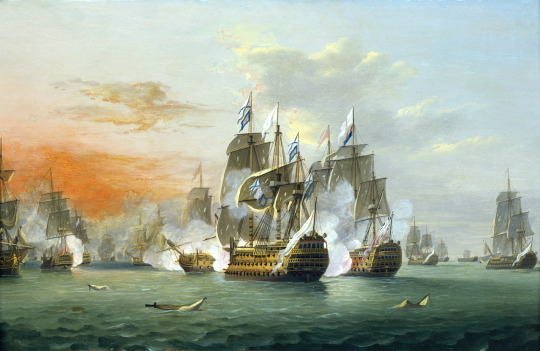
The Ville de Paris ,104- guns flagship of de Grasse, is fully seen in the centre on the left. Admiral Sir George Rodney, in the Formidable, 90- guns is engaging her to starboard on the right
It would take 11 years until the next first rate managed to get into the fangs of the Royal Navy. In August 1793 the Commerce de Marsaille, 120- guns, was caught before Toulon and in December it was brought to England. There it was re-equipped and put into service with fewer men (875) than it was the case with the French, but by the English canons which she carried now she did not need the enormous number of 1098 men any more. But also her fate was not really a good one and as she should be used as a huge troop transporter she sank during a storm. Also her sister ship (first Dauphin Royal, then Sans Culotte, and finally Orient) blew up during the Battle of the Nile in 1798.
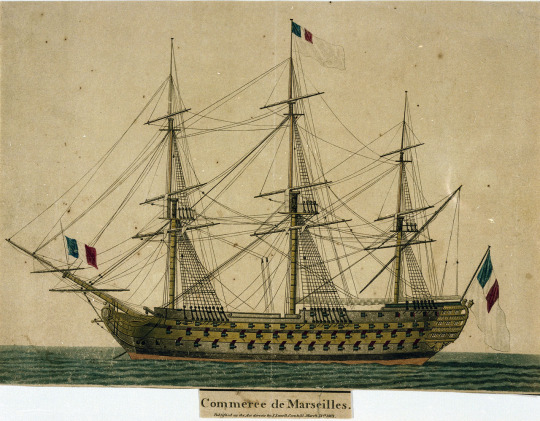
The Commerce de Marsaille, 120- guns
There the British had more luck with the Spaniards. These had begun in the years 1779 - 1794 with first, three three-deckers and had extended this then by seven further. So Admiral Sir John Jarvis was confronted with seven of them when Admiral Don José de Córdoba y Ramos with his 36 ships came to Cape St. Vincent, 1797, to put Jarvis. Even if the British were far inferior with their 22 ships, they managed to catch two first rates, the San Josef, 112-guns, and the Salvador del Mundo, 112- guns. Salvador de Mundo was accepted into the Royal Navy under her own name and subsequently served in port service during the rest of the French Revolutionary Wars and the subsequent Napoleonic Wars. At the end of the wars, when she was decommissioned and broken up.
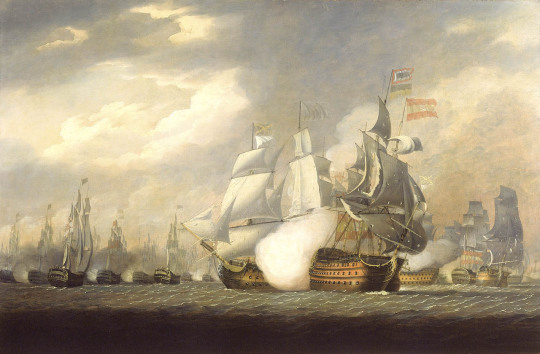
The Victory Raking the Spanish Salvador del Mundo at the Battle of Cape St Vincent, 14 February, 1797
The San Josef was also in service and was in the active service until 1807 when she was taken out and used from 1837 as a gunnery training ship. From 10 August 1841 she was commanded by Captain Joseph Needham Tayler, serving as a guard ship at Devonport (established gunnery school). Other captains who served in her include: Captain Frederick William Burgoyne, while serving as the flagship of Samuel Pym, Plymouth; Captain Henry John Leeke; and Captain Thomas Maitland, as the flagship of Admiral William Hall Gage, Devonport. She was broken up a Devonport in May 1849.
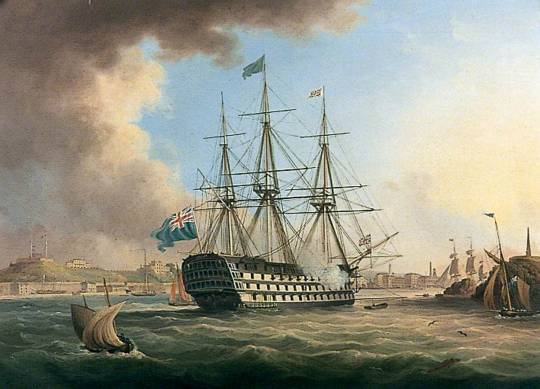
HMS San Josef, 112- guns, as a gunnery training ship
In 1801 the Real Charlos and San Hermenegildo, both with 112 guns, were destroyed off Gibraltar. At the Battle of Trafalgar 1805, the Santissima Trinidad, once the pride of the Spanish Navy with 130 guns, was destroyed.
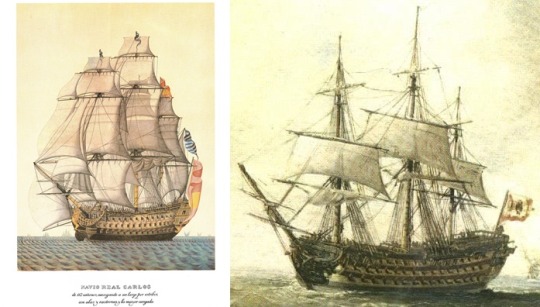
Real Charlos ( left) and the San Hermenegildo (right), both with 112- guns
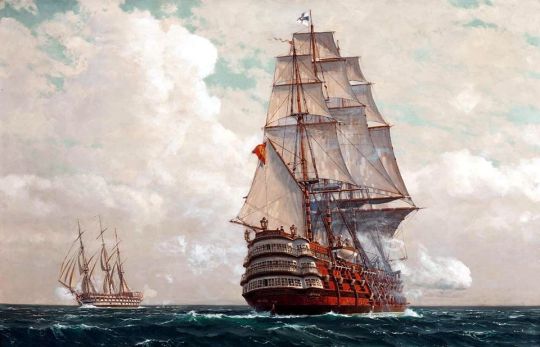
The Santissima Trinidad, 130- guns
The last enemy three decker that was destroyed was the Impérial, 118 guns. She was built as Vengeur in 1804 and then renamed. However, she ran aground during the Battle of San Domingo in 1806, and was destroyed in the process.
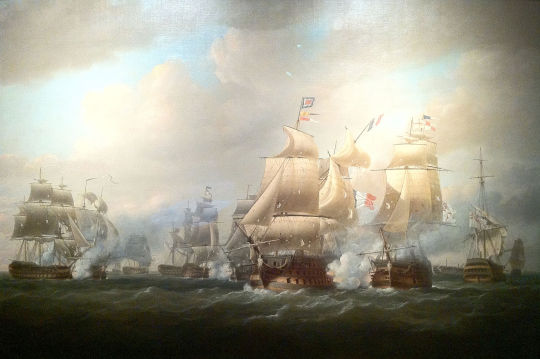
The Battle of San Domingo 1806 : Impérial harassed by the much weaker HMS Northumberland before being driven ashore
118 notes
·
View notes
Note
Have you read all of Samuel Pepys' diary? What are your favourite parts in it?
Most of it but it’s very very long and very extensive. Some of it is boring (in that, it’s literally just him listing off a load of work he got done at the Admiralty) but then some of it is just priceless. He’s a bit of a bugger, to be honest, I don’t like him much but he lived a really rich, nuanced life and his diaries are a reflection of this, hence why they’re such a brilliant source for anyone wanting to be truly immersed in Restoration England.
I have a few favourite parts/aspects:
Keeping goldfish as pets was something that came to England in the 17th century, presumably because of our strengthening trade links with the East. Samuel Pepys saw his first pet goldfish on the 28th May, 1665: “Thence home and to see my Lady Pen, where my wife and I were shown a fine rarity: of fishes kept in a glass of water, that will live so for ever; and finely marked they are, being foreign.”
I particularly enjoy his frequent references to cake shops and places that sell baked goods because he often picks up said baked goods on his way home. Kind of like an early modern takeaway. His favourite shop for this is somewhere called Wilkinson’s, on King Street. It was a cookshop and restaurant. Pepys buys all sorts of things there, including scotch cakes, mince pies and cheesecake.
So, Pepys’ main girlfriend (the one his wife walked in on him fingering...) was the actress, Mary Knepp. He calls her “Knipp.” He’s rather a dull boyfriend: occasionally he tells us of sexy assignations together in Hyde Park (AKA “Just got a blowjob in the bushes, lads”) or about how he spent New Year playing with her tits in a rowdy carriage home. However, there is one particularly nice thing about their relationship. Around the time he met her, he’d been setting one of Suleiman the Magnificent’s poems to Hurrem Sultan (he calls them “Solyman and Roxelana”) to music, since he fancied himself as quite the musician, and he ended up presenting it to Knipp. Since Suleiman’s poems for Hurrem are super romantic, I can’t help but feel slightly moved by such a gesture.
Now, Pepys’ boss, since he worked at the Admiralty, was King Charles II’s brother, James (who was Lord High Admiral, ofc). He’s a little bit in love with James, actually. He mentions him almost 1000 times in his diary. Some of it is simply work related but then some of it is more intimate, particularly personal aspects of their “friendship” (if one can call it thus). I wish I could find the actual quote for this, but sifting through all Pepys’ mentions of James is a slog so essentially: they were out walking in St. James’ Park when it began to rain particularly heavily. James asked to borrow Pepys’ coat and Pepys (reluctantly) handed it over. This wouldn’t be funny except James was VERY tall and athletic, whereas Pepys was short and a little more well-built. I doubt the coat fit James too well.
Another one of his many girlfriends, is one Doll Lane/Powell. What’s really interesting about his interactions with Doll is that we get to see a sense of Pepys’ misogyny (and subsequently, the misogyny of the time). One day, Doll goes to fetch some wine for her heavily pregnant sister. She returns, in tears, because a Dutch soldier has essentially assaulted her. Pepys doesn’t feel sorry for her: in fact, he says “Doll, who went for a bottle of wine, did come home all blubbering and swearing against one Captain Vandener, a Dutchman of the Rhenish Wine House, that pulled her into a stable by the Dog tavern, and there did tumble her and toss her, calling him all the rogues and toads in the world, when she knows that elle (she) hath suffered me to do any thing with her a hundred times.” Does he not understand that woman are actual human beings who may want to have sex with one person but not with another?
Every Brit’s favourite seaside entertainment: PUNCH AND JUDY PUPPET SHOWS!!! Despite how problematic they are. Anyway, it’s originally an Italian thing. Pepys records his first time seeing a Punch and Judy show in 1662. He says he saw a “pretty” Italian puppet play, put on by one Mr. Bologna, in Covent Garden and that it was very popular with “gallants” (foppish men from court). Can you imagine....a bunch of courtly, supposedly cultured libertines sitting around watching Judy beat the shit out of Punch with her rolling pin for the sixth billionth time, and Punch trying to protect his string of sausages from the crocodile and the dog, whilst neglecting his new born baby in the process........GOD...I can’t even fathom the sight of it. There’s a plaque in Covent Garden commemorating this day in history.
I honestly could name so many more......Nell’s first performance in her boy clothes.....Charles II being good old Charlie.....the Duke of Monmouth going from a strange, sad illegitimate son to a gangly, handsome rake......the list goes on and on and on
16 notes
·
View notes
Text
[Ilya Somin] More on libertarian skepticism about democracy – a rejoinder to Will Wilkinson
Will Wilkinson of the Niskanen Center has posted an insightful response to my critique of his essay blaming libertarian skepticism of democracy for many of the flaws of the present-day Republican right (and, by extension, American politics generally). In my earlier post, I argued that Wilkinson was wrong to associate libertarian skepticism towards democracy with property rights absolutism, and also greatly overestimates the influence of this aspect of libertarian thought on current Republican politics. In his response, Wilkinson contends that I misunderstood significant aspects of his position, and continues to defend both his view of libertarianism and his analysis of its influence on the Republicans. While I am sorry I misunderstood some parts of Wilkinson’s analysis, I continue to disagree with him on both of these issues.
In his response, Wilkinson relies heavily on his definition of “libertarianism” as incorporating an absolutist view of property rights, as opposed to “classical liberalism,” which seeks to put tight limits on government, but does not hold that property rights must be absolute. I admit I underestimated the importance of this distinction to Wilkinson’s argument. If the only true “libertarians” are property rights absolutists, Wilkinson is able to exclude the vast majority of thinkers who are usually considered libertarian, including Milton Friedman, F.A. Hayek, James Buchanan, and Richard Epstein (by far the most influential living libertarian property rights scholar).
He also ends up excluding all the people he himself identified as notable recent libertarian skeptics of democracy: Bryan Caplan, Jason Brennan, and myself, none of whom are property rights absolutists. For reasons noted in my earlier post, such a definition would even exclude Robert Nozick, generally considered the most influential libertarian political philosopher of the last fifty years. A definition of libertarianism that excludes Friedman, Hayek, Buchanan,and Nozick is, at the very least, idiosyncratic. It is also a definition that includes only a very narrow range of thinkers, which makes it quite unlikely that this small group had a great influence on American politics of the sort Wilkinson ascribes to it.
Wilkinson even goes so far as to claim (quoting political philosopher Samuel Freeman) that “libertarianism,” as he defines it, is not even a type of liberalism at all, but rather a subset of “feudalism,” because like feudalism, it “rejects the idea, essential to liberalism, that political power is a public power, to be impartially exercised for the common good.” This strikes me as implausible, even applied to those libertarians who are property rights absolutists. The latter (with the possible exception of anarchists, who advocate the complete abolition of government) still maintain that political power should be impartial and that it should be exercised for the common good. They simply believe that political power should control a much smaller portion of society than adherents of other ideologies do. Liberals of all stripes, however, believe that some issues should be off-limits to the government. Property-rights absolutists merely have an especially expansive view of those constraints. They may be wrong about that. But they are not meaningfully comparable to feudalists.
By defining libertarianism in an implausibly narrow way, Wilkinson is able to buttress the logical coherence of his interpretation of that ideology. But he does so at the price of greatly weakening any possible claim that it has had much influence. It is especially hard to claim that libertarianism has had any great influence on attitudes towards democracy if your definition of libertarianism excludes those libertarian thinkers who (Buchanan, Hayek, and – more recently, people like Brennan and Caplan) who have wrote most extensively about democracy’s flaws and had the biggest impact on debates over democratic theory.
Wilkinson unintentionally further muddies the waters by claiming that Brennan, Caplan, and I are “culturally libertarian” even if our thought is not, in the same way that some atheists are “culturally” Catholic or Mormon. This strikes me as incoherent. Regardless of their “cultural” origins, these individuals and their works do not fit Wilkinson’s narrow definition of “libertarian” and therefore cannot be used to buttress his argument for the importance of libertarian skepticism about democracy. If, on the other hand, these authors do qualify as “libertarian,” after all, then that undercuts Wilkinson’s claim that libertarian skepticism about democracy is closely linked to property rights rights absolutism.
In his reply, Wilkinson suggests that “Somin is wrong to say that I’m arguing that property rights absolutism drives libertarian democracy skepticism. On the contrary, I’m arguing that classical liberal democracy skepticism drove the adoption of property rights absolutism, which launched libertarianism as a distinct ideology.” I appreciate the correction. But it does not change the fact that 1) property rights absolutism is not the ideology of most of those thinkers usually considered libertarian (including those who have had the most influence on debates over democracy), and 2) it is not the major determinant of present-day skepticism about democracy either among self-described libertarians or the non-libertarian political right. Moreover, I am skeptical of his claim that property-rights absolutists adopted such views because of skepticism about democracy, as opposed to vice versa. They themselves generally argue that property-rights absolutism is a logical outgrowth of theories of natural rights and individual autonomy.
In the most defensible part of his reply, Wilkinson focuses on two libertarian property-rights absolutists who did have at least some substantial impact: Ayn Rand and Murray Rothbard. He notes that a number of Republican legislators (including House Speaker Paul Ryan) are admirers of Rand, and that Rothbard had an influence on Robert Nozick and some other influential libertarians. As I explained in my earlier post, it is far from clear how much Ryan is really a follower of Ayn Rand. He supports a great many policies that she abhorred. But the key point here is that there is little if any evidence to show that Ryan and the other politicians mentioned endorse Rand’s property-rights absolutism, and a good deal of evidence that they do not (in so far as they support many policies that infringe property rights in ways she would have opposed).
Rand was (and still is, long after her death) a best-selling author whose books are read by millions. But few of them endorse her property-rights absolutism, as opposed to her general admiration for free markets and entrepreneurship. The same is true of Rothbard, whose influence was confined to a much narrower sphere. Few of the noteworthy libertarians influenced by Rothbard endorsed his property-rights absolutism, as opposed to a more general advocacy of strict limitations on government, which he shared with people that Wilkinson would classify as “classical liberal.”
Wilkinson also links Rothbard to current GOP populism by way of his advocacy of an alliance with right-wing populists in the early 1990s. Like Wilkinson, I am no fan of this awful part of Rothbard’s record. But it is important to remember that this came long after the period when Rothbard had a significant intellectual influence on other libertarians (which was mostly in the 1960s and 1970s). During much of that era, Rothbard actually advocated a political alliance with the radical left. Moreover, Rothbard’s later “paleolibertarian” stance was largely the result of his (faulty) judgment on where libertarians might be able to find political allies, not a claim that right-wing populism is somehow a natural outgrowth of libertarian ideas.
More generally, nothing in Wilkinson’s reply refutes my key point that today’s GOP is actually moving away from libertarian ideas towards endorsement of right-wing populism and extensive government spending and regulation, and that property-rights absolutism has very little influence in GOP circles. That makes it very hard to blame libertarian ideas for the GOP’s present flaws.
The GOP’s recent turn towards right-wing populism has actually increased tensions between libertarians and Republicans, with the result that, in the 2016 election, Libertarian Party candidate Gary Johnson got 3.25% of the national vote, more than three times the previous record for the party’s nominee. Most of the new Johnson voters are people who previously tended to support the GOP, but were alienated by the rise of big-government populism epitomized by Donald Trump. This is yet another sign that the present GOP is moving away from libertarianism rather than towards it, and that it makes little sense to blame the latter for the dangerous tendencies of the former.
I end with this point from my earlier post, which Wilkinson has not so far addressed. Far from being a major cause of our present troubles, libertarian skepticism about democracy can be a valuable part of the antidote:
The biggest flaw of the current GOP is not their supposed hostility to majoritarian democracy, but almost the exact opposite: their embrace of a populism that appeals to some of the worst instincts of the less knowledgeable part of their constituency. Donald Trump’s 2016 campaign strategy was in many ways a textbook example of the exploitation of the very sort of political ignorance that libertarians have long warned us against….
Overcoming our current political pathologies will not be easy. But libertarian critiques of democracy can be a useful part of the solution. For example, limiting and decentralizing government power can help reduce the harm caused by voter ignorance and prejudice – including the xenophobic populist nationalism that Wilkinson rightly fears. When people “vote with their feet” in the private sector or in a federal system, they tend to make better-informed and less prejudiced decisions than at the ballot box.There is much we can do to expand opportunities for foot voting, particularly for the poor.
Political decentralization of the sort championed by libertarians can also help defuse the fear and partisan hatred that make ignorance and bias an especially grave menace today. One need not be a full-blown libertarian to recognize that libertarian concerns about democracy have some merit….
0 notes
Text
More on libertarian skepticism about democracy – a rejoinder to Will Wilkinson
Will Wilkinson of the Niskanen Center has posted an insightful response to my critique of his essay blaming libertarian skepticism of democracy for many of the flaws of the present-day Republican right (and, by extension, American politics generally). In my earlier post, I argued that Wilkinson was wrong to associate libertarian skepticism towards democracy with property rights absolutism, and also greatly overestimates the influence of this aspect of libertarian thought on current Republican politics. In his response, Wilkinson contends that I misunderstood significant aspects of his position, and continues to defend both his view of libertarianism and his analysis of its influence on the Republicans. While I am sorry I misunderstood some parts of Wilkinson’s analysis, I continue to disagree with him on both of these issues.
In his response, Wilkinson relies heavily on his definition of “libertarianism” as incorporating an absolutist view of property rights, as opposed to “classical liberalism,” which seeks to put tight limits on government, but does not hold that property rights must be absolute. I admit I underestimated the importance of this distinction to Wilkinson’s argument. If the only true “libertarians” are property rights absolutists, Wilkinson is able to exclude the vast majority of thinkers who are usually considered libertarian, including Milton Friedman, F.A. Hayek, James Buchanan, and Richard Epstein (by far the most influential living libertarian property rights scholar).
He also ends up excluding all the people he himself identified as notable recent libertarian skeptics of democracy: Bryan Caplan, Jason Brennan, and myself, none of whom are property rights absolutists. For reasons noted in my earlier post, such a definition would even exclude Robert Nozick, generally considered the most influential libertarian political philosopher of the last fifty years. A definition of libertarianism that excludes Friedman, Hayek, Buchanan,and Nozick is, at the very least, idiosyncratic. It is also a definition that includes only a very narrow range of thinkers, which makes it quite unlikely that this small group had a great influence on American politics of the sort Wilkinson ascribes to it.
Wilkinson even goes so far as to claim (quoting political philosopher Samuel Freeman) that “libertarianism,” as he defines it, is not even a type of liberalism at all, but rather a subset of “feudalism,” because like feudalism, it “rejects the idea, essential to liberalism, that political power is a public power, to be impartially exercised for the common good.” This strikes me as implausible, even applied to those libertarians who are property rights absolutists. The latter (with the possible exception of anarchists, who advocate the complete abolition of government) still maintain that political power should be impartial and that it should be exercised for the common good. They simply believe that political power should control a much smaller portion of society than adherents of other ideologies do. Liberals of all stripes, however, believe that some issues should be off-limits to the government. Property-rights absolutists merely have an especially expansive view of those constraints. They may be wrong about that. But they are not meaningfully comparable to feudalists.
By defining libertarianism in an implausibly narrow way, Wilkinson is able to buttress the logical coherence of his interpretation of that ideology. But he does so at the price of greatly weakening any possible claim that it has had much influence. It is especially hard to claim that libertarianism has had any great influence on attitudes towards democracy if your definition of libertarianism excludes those libertarian thinkers who (Buchanan, Hayek, and – more recently, people like Brennan and Caplan) who have wrote most extensively about democracy’s flaws and had the biggest impact on debates over democratic theory.
Wilkinson unintentionally further muddies the waters by claiming that Brennan, Caplan, and I are “culturally libertarian” even if our thought is not, in the same way that some atheists are “culturally” Catholic or Mormon. This strikes me as incoherent. Regardless of their “cultural” origins, these individuals and their works do not fit Wilkinson’s narrow definition of “libertarian” and therefore cannot be used to buttress his argument for the importance of libertarian skepticism about democracy. If, on the other hand, these authors do qualify as “libertarian,” after all, then that undercuts Wilkinson’s claim that libertarian skepticism about democracy is closely linked to property rights rights absolutism.
In his reply, Wilkinson suggests that “Somin is wrong to say that I’m arguing that property rights absolutism drives libertarian democracy skepticism. On the contrary, I’m arguing that classical liberal democracy skepticism drove the adoption of property rights absolutism, which launched libertarianism as a distinct ideology.” I appreciate the correction. But it does not change the fact that 1) property rights absolutism is not the ideology of most of those thinkers usually considered libertarian (including those who have had the most influence on debates over democracy), and 2) it is not the major determinant of present-day skepticism about democracy either among self-described libertarians or the non-libertarian political right. Moreover, I am skeptical of his claim that property-rights absolutists adopted such views because of skepticism about democracy, as opposed to vice versa. They themselves generally argue that property-rights absolutism is a logical outgrowth of theories of natural rights and individual autonomy.
In the most defensible part of his reply, Wilkinson focuses on two libertarian property-rights absolutists who did have at least some substantial impact: Ayn Rand and Murray Rothbard. He notes that a number of Republican legislators (including House Speaker Paul Ryan) are admirers of Rand, and that Rothbard had an influence on Robert Nozick and some other influential libertarians. As I explained in my earlier post, it is far from clear how much Ryan is really a follower of Ayn Rand. He supports a great many policies that she abhorred. But the key point here is that there is little if any evidence to show that Ryan and the other politicians mentioned endorse Rand’s property-rights absolutism, and a good deal of evidence that they do not (in so far as they support many policies that infringe property rights in ways she would have opposed).
Rand was (and still is, long after her death) a best-selling author whose books are read by millions. But few of them endorse her property-rights absolutism, as opposed to her general admiration for free markets and entrepreneurship. The same is true of Rothbard, whose influence was confined to a much narrower sphere. Few of the noteworthy libertarians influenced by Rothbard endorsed his property-rights absolutism, as opposed to a more general advocacy of strict limitations on government, which he shared with people that Wilkinson would classify as “classical liberal.”
Wilkinson also links Rothbard to current GOP populism by way of his advocacy of an alliance with right-wing populists in the early 1990s. Like Wilkinson, I am no fan of this awful part of Rothbard’s record. But it is important to remember that this came long after the period when Rothbard had a significant intellectual influence on other libertarians (which was mostly in the 1960s and 1970s). During much of that era, Rothbard actually advocated a political alliance with the radical left. Moreover, Rothbard’s later “paleolibertarian” stance was largely the result of his (faulty) judgment on where libertarians might be able to find political allies, not a claim that right-wing populism is somehow a natural outgrowth of libertarian ideas.
More generally, nothing in Wilkinson’s reply refutes my key point that today’s GOP is actually moving away from libertarian ideas towards endorsement of right-wing populism and extensive government spending and regulation, and that property-rights absolutism has very little influence in GOP circles. That makes it very hard to blame libertarian ideas for the GOP’s present flaws.
The GOP’s recent turn towards right-wing populism has actually increased tensions between libertarians and Republicans, with the result that, in the 2016 election, Libertarian Party candidate Gary Johnson got 3.25% of the national vote, more than three times the previous record for the party’s nominee. Most of the new Johnson voters are people who previously tended to support the GOP, but were alienated by the rise of big-government populism epitomized by Donald Trump. This is yet another sign that the present GOP is moving away from libertarianism rather than towards it, and that it makes little sense to blame the latter for the dangerous tendencies of the former.
I end with this point from my earlier post, which Wilkinson has not so far addressed. Far from being a major cause of our present troubles, libertarian skepticism about democracy can be a valuable part of the antidote:
The biggest flaw of the current GOP is not their supposed hostility to majoritarian democracy, but almost the exact opposite: their embrace of a populism that appeals to some of the worst instincts of the less knowledgeable part of their constituency. Donald Trump’s 2016 campaign strategy was in many ways a textbook example of the exploitation of the very sort of political ignorance that libertarians have long warned us against….
Overcoming our current political pathologies will not be easy. But libertarian critiques of democracy can be a useful part of the solution. For example, limiting and decentralizing government power can help reduce the harm caused by voter ignorance and prejudice – including the xenophobic populist nationalism that Wilkinson rightly fears. When people “vote with their feet” in the private sector or in a federal system, they tend to make better-informed and less prejudiced decisions than at the ballot box.There is much we can do to expand opportunities for foot voting, particularly for the poor.
Political decentralization of the sort championed by libertarians can also help defuse the fear and partisan hatred that make ignorance and bias an especially grave menace today. One need not be a full-blown libertarian to recognize that libertarian concerns about democracy have some merit….
Originally Found On: http://www.washingtonpost.com/news/volokh-conspiracy/wp/2017/11/17/more-on-libertarian-skepticism-about-democracy-a-rejoinder-to-will-wilkinson/
0 notes
Text
More on libertarian skepticism about democracy – a rejoinder to Will Wilkinson
Will Wilkinson of the Niskanen Center has posted an insightful response to my critique of his essay blaming libertarian skepticism of democracy for many of the flaws of the present-day Republican right (and, by extension, American politics generally). In my earlier post, I argued that Wilkinson was wrong to associate libertarian skepticism towards democracy with property rights absolutism, and also greatly overestimates the influence of this aspect of libertarian thought on current Republican politics. In his response, Wilkinson contends that I misunderstood significant aspects of his position, and continues to defend both his view of libertarianism and his analysis of its influence on the Republicans. While I am sorry I misunderstood some parts of Wilkinson’s analysis, I continue to disagree with him on both of these issues.
In his response, Wilkinson relies heavily on his definition of “libertarianism” as incorporating an absolutist view of property rights, as opposed to “classical liberalism,” which seeks to put tight limits on government, but does not hold that property rights must be absolute. I admit I underestimated the importance of this distinction to Wilkinson’s argument. If the only true “libertarians” are property rights absolutists, Wilkinson is able to exclude the vast majority of thinkers who are usually considered libertarian, including Milton Friedman, F.A. Hayek, James Buchanan, and Richard Epstein (by far the most influential living libertarian property rights scholar).
He also ends up excluding all the people he himself identified as notable recent libertarian skeptics of democracy: Bryan Caplan, Jason Brennan, and myself, none of whom are property rights absolutists. For reasons noted in my earlier post, such a definition would even exclude Robert Nozick, generally considered the most influential libertarian political philosopher of the last fifty years. A definition of libertarianism that excludes Friedman, Hayek, Buchanan,and Nozick is, at the very least, idiosyncratic. It is also a definition that includes only a very narrow range of thinkers, which makes it quite unlikely that this small group had a great influence on American politics of the sort Wilkinson ascribes to it.
Wilkinson even goes so far as to claim (quoting political philosopher Samuel Freeman) that “libertarianism,” as he defines it, is not even a type of liberalism at all, but rather a subset of “feudalism,” because like feudalism, it “rejects the idea, essential to liberalism, that political power is a public power, to be impartially exercised for the common good.” This strikes me as implausible, even applied to those libertarians who are property rights absolutists. The latter (with the possible exception of anarchists, who advocate the complete abolition of government) still maintain that political power should be impartial and that it should be exercised for the common good. They simply believe that political power should control a much smaller portion of society than adherents of other ideologies do. Liberals of all stripes, however, believe that some issues should be off-limits to the government. Property-rights absolutists merely have an especially expansive view of those constraints. They may be wrong about that. But they are not meaningfully comparable to feudalists.
By defining libertarianism in an implausibly narrow way, Wilkinson is able to buttress the logical coherence of his interpretation of that ideology. But he does so at the price of greatly weakening any possible claim that it has had much influence. It is especially hard to claim that libertarianism has had any great influence on attitudes towards democracy if your definition of libertarianism excludes those libertarian thinkers who (Buchanan, Hayek, and – more recently, people like Brennan and Caplan) who have wrote most extensively about democracy’s flaws and had the biggest impact on debates over democratic theory.
Wilkinson unintentionally further muddies the waters by claiming that Brennan, Caplan, and I are “culturally libertarian” even if our thought is not, in the same way that some atheists are “culturally” Catholic or Mormon. This strikes me as incoherent. Regardless of their “cultural” origins, these individuals and their works do not fit Wilkinson’s narrow definition of “libertarian” and therefore cannot be used to buttress his argument for the importance of libertarian skepticism about democracy. If, on the other hand, these authors do qualify as “libertarian,” after all, then that undercuts Wilkinson’s claim that libertarian skepticism about democracy is closely linked to property rights rights absolutism.
In his reply, Wilkinson suggests that “Somin is wrong to say that I’m arguing that property rights absolutism drives libertarian democracy skepticism. On the contrary, I’m arguing that classical liberal democracy skepticism drove the adoption of property rights absolutism, which launched libertarianism as a distinct ideology.” I appreciate the correction. But it does not change the fact that 1) property rights absolutism is not the ideology of most of those thinkers usually considered libertarian (including those who have had the most influence on debates over democracy), and 2) it is not the major determinant of present-day skepticism about democracy either among self-described libertarians or the non-libertarian political right. Moreover, I am skeptical of his claim that property-rights absolutists adopted such views because of skepticism about democracy, as opposed to vice versa. They themselves generally argue that property-rights absolutism is a logical outgrowth of theories of natural rights and individual autonomy.
In the most defensible part of his reply, Wilkinson focuses on two libertarian property-rights absolutists who did have at least some substantial impact: Ayn Rand and Murray Rothbard. He notes that a number of Republican legislators (including House Speaker Paul Ryan) are admirers of Rand, and that Rothbard had an influence on Robert Nozick and some other influential libertarians. As I explained in my earlier post, it is far from clear how much Ryan is really a follower of Ayn Rand. He supports a great many policies that she abhorred. But the key point here is that there is little if any evidence to show that Ryan and the other politicians mentioned endorse Rand’s property-rights absolutism, and a good deal of evidence that they do not (in so far as they support many policies that infringe property rights in ways she would have opposed).
Rand was (and still is, long after her death) a best-selling author whose books are read by millions. But few of them endorse her property-rights absolutism, as opposed to her general admiration for free markets and entrepreneurship. The same is true of Rothbard, whose influence was confined to a much narrower sphere. Few of the noteworthy libertarians influenced by Rothbard endorsed his property-rights absolutism, as opposed to a more general advocacy of strict limitations on government, which he shared with people that Wilkinson would classify as “classical liberal.”
Wilkinson also links Rothbard to current GOP populism by way of his advocacy of an alliance with right-wing populists in the early 1990s. Like Wilkinson, I am no fan of this awful part of Rothbard’s record. But it is important to remember that this came long after the period when Rothbard had a significant intellectual influence on other libertarians (which was mostly in the 1960s and 1970s). During much of that era, Rothbard actually advocated a political alliance with the radical left. Moreover, Rothbard’s later “paleolibertarian” stance was largely the result of his (faulty) judgment on where libertarians might be able to find political allies, not a claim that right-wing populism is somehow a natural outgrowth of libertarian ideas.
More generally, nothing in Wilkinson’s reply refutes my key point that today’s GOP is actually moving away from libertarian ideas towards endorsement of right-wing populism and extensive government spending and regulation, and that property-rights absolutism has very little influence in GOP circles. That makes it very hard to blame libertarian ideas for the GOP’s present flaws.
The GOP’s recent turn towards right-wing populism has actually increased tensions between libertarians and Republicans, with the result that, in the 2016 election, Libertarian Party candidate Gary Johnson got 3.25% of the national vote, more than three times the previous record for the party’s nominee. Most of the new Johnson voters are people who previously tended to support the GOP, but were alienated by the rise of big-government populism epitomized by Donald Trump. This is yet another sign that the present GOP is moving away from libertarianism rather than towards it, and that it makes little sense to blame the latter for the dangerous tendencies of the former.
I end with this point from my earlier post, which Wilkinson has not so far addressed. Far from being a major cause of our present troubles, libertarian skepticism about democracy can be a valuable part of the antidote:
The biggest flaw of the current GOP is not their supposed hostility to majoritarian democracy, but almost the exact opposite: their embrace of a populism that appeals to some of the worst instincts of the less knowledgeable part of their constituency. Donald Trump’s 2016 campaign strategy was in many ways a textbook example of the exploitation of the very sort of political ignorance that libertarians have long warned us against….
Overcoming our current political pathologies will not be easy. But libertarian critiques of democracy can be a useful part of the solution. For example, limiting and decentralizing government power can help reduce the harm caused by voter ignorance and prejudice – including the xenophobic populist nationalism that Wilkinson rightly fears. When people “vote with their feet” in the private sector or in a federal system, they tend to make better-informed and less prejudiced decisions than at the ballot box.There is much we can do to expand opportunities for foot voting, particularly for the poor.
Political decentralization of the sort championed by libertarians can also help defuse the fear and partisan hatred that make ignorance and bias an especially grave menace today. One need not be a full-blown libertarian to recognize that libertarian concerns about democracy have some merit….
Originally Found On: http://www.washingtonpost.com/news/volokh-conspiracy/wp/2017/11/17/more-on-libertarian-skepticism-about-democracy-a-rejoinder-to-will-wilkinson/
0 notes